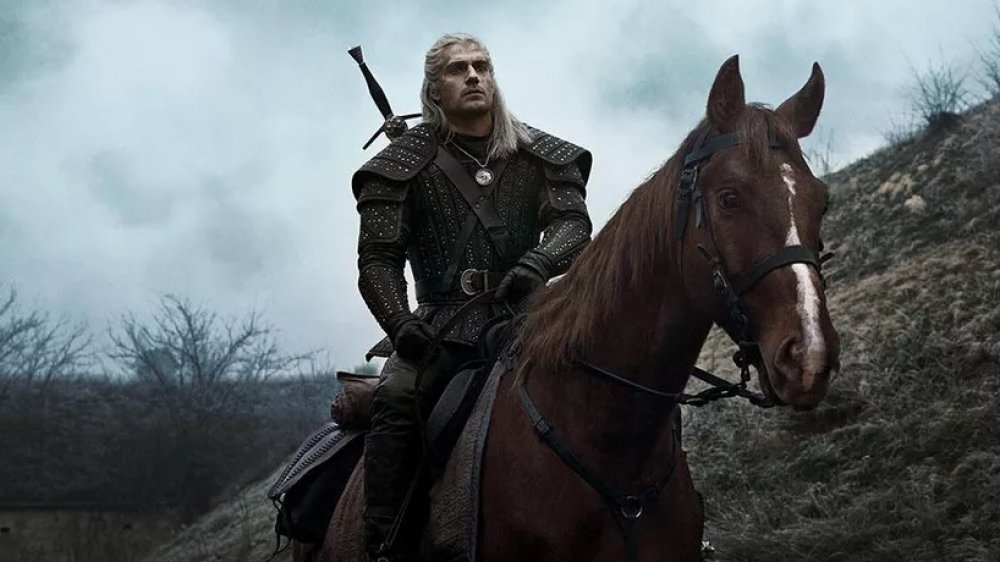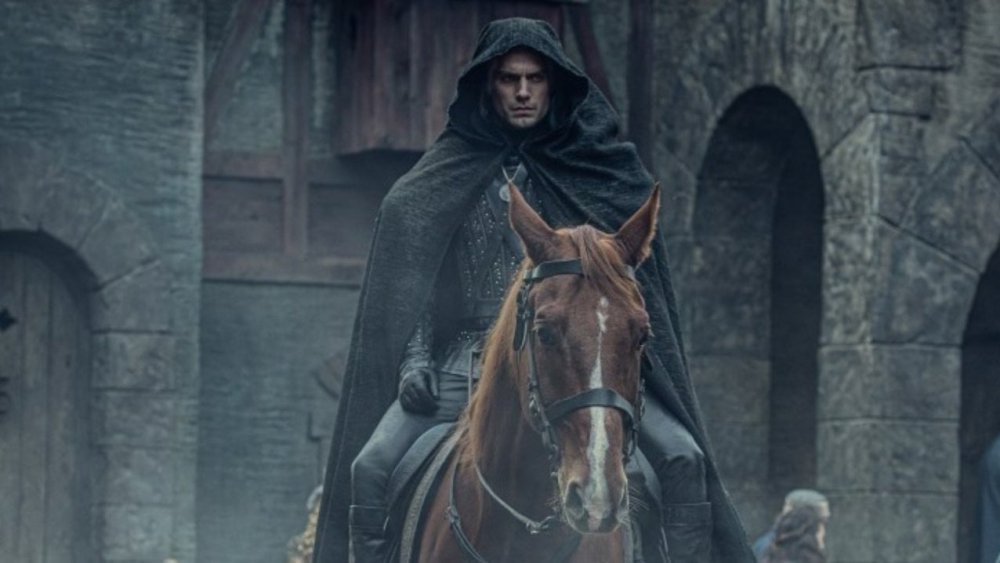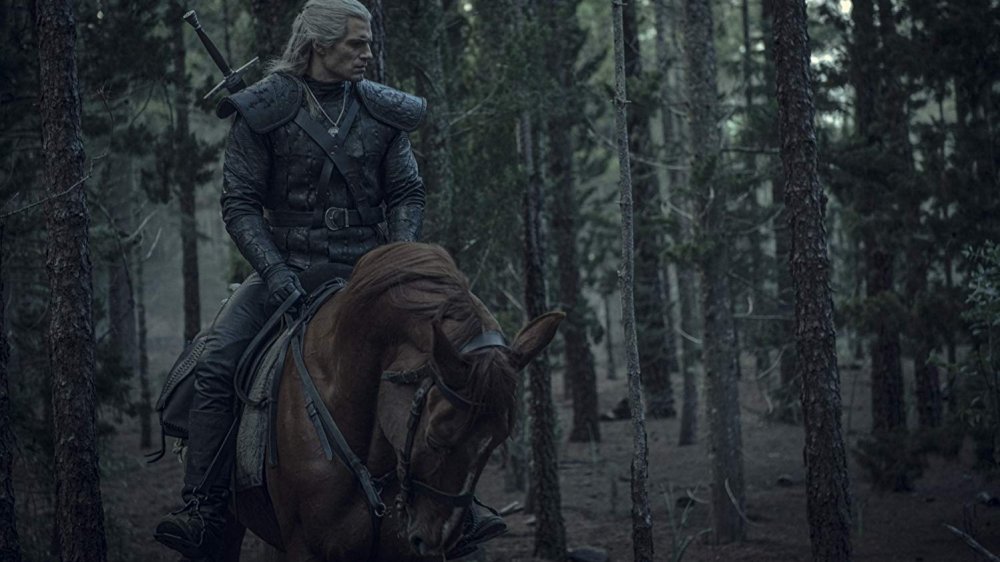The Real Reason The Witcher's Horse Is Named Roach
For readers of Andrzej Sapkowski's fantasy novels and shorts as well as gamers who adore CD Projekt Red's action-RPG Witcher trilogy, Geralt of Rivia's relationship to his steed — or more accurately, steeds — is quite well-known. But when the first trailer for Netflix's The Witcher dropped, those new to the series' rich and highly intentional universe were somewhat caught off-guard about why the gruff and imposing monster-slayer called his best (and at times only) friend "Roach."
Some thought they might get the answer when The Witcher debuted on Netflix in December. However, when the entire first season finally arrived on the streaming platform, it failed to address in any concrete way why Geralt had given his bay mare such a seemingly distasteful and disparaging name. Geralt's aggressive protection and emotional connection to the horse might appear contradictory to how he addresses it, but the "Roach title" does have significant meaning.
The Witcher creator-slash-showrunner Lauren Schmidt Hissrich may have left the story behind the name of Geralt's steed intentionally ambiguous — yet another subtle but notable easter egg for fans of the books and video games — but in Sapkowski's novels, the begrudging relationship that forms between the monster-hunter-for-hire and his primary mode of transportation references the steed's habit of being replaced.
On the Netflix series and in the Witcher books and video games, Geralt and Roach partner up across all three of the main characters' various timelines. That means the steed is with his unsavory-sounding name for quite some time — but while Geralt may have a life-span that's been rather dramatically extended thanks to his genetic mutations, the mare that stands at his side does not. In Sapkowski's third Witcher novel, Baptism of Fire, Geralt confirms that he names all of his horses Roach — while also at one point declaring, "I look forward to the first opportunity I have to get rid of this animal! May it die, I'd even exchange it for an ass!" The exclamation affirms how Geralt's current Roach is simply one among many, a common — and thus physically and emotionally replaceable — thing to Geralt.
It hardly seems coincidental that "roach" is also the name of a fresh- and brackish-water fish. Also known as the "common roach," the fish is native to Europe — and with Central and Northern European cultures acting as an inspirational foundation for the fictional lands of the Northern Kingdom in Sapkowski's books, it makes sense that he might be nodding to the prevalent aquatic creatures and their "sea full of fish" metaphors over the insects of the same name. This careful turn of language explains, at least in the beginning, how Geralt chose the naming convention for all his horses: they were objects, things that could be seen everywhere, not partners to be cherished.
However, that's not where the name's origins entirely lie. Geralt may have regularly proclaimed little attachment to his Roaches, but another understanding of the name reveals a deeper meaning behind it.
There's actually a more affectionate meaning behind the name "Roach"
While dogs are widely considered a man's best friend, Geralt of Rivia is no mere man — which is exactly why it's fitting for him to have a significantly larger, loyal, equestrian companion. What's seemingly less fitting, however, is the horse's name. It's an example of how, as with just about everything in Geralt's life, looks can be deceiving and obscure a truer meaning.
It's true that the Witcher may have initially given his rotation of horses the name to further sell how he's a mutated man without human "afflictions" like emotion, the Polish meaning of the name — something the books' Polish author would be familiar with — counters this. While the monster hunter doesn't care to give any single one of his numerous steeds their own name, his use of the name "Roach" actually points to a term of endearment in the central European country.
"Płotka" is the original Polish (and feminine-gendered) term for a horse, and the name's feminine-alignment underscores Geralt's preference across The Witcher universe for mares over stallions. "Płotka" is also an informal or nickname version of the word "płoć," which literally translates to "roach" or the laxer "roachy." Like most nicknames, it's given as a form of affection, which Regis, a hundreds-year-old vampire from The Witcher book series, points out to Geralt in the Baptism of Fire. "I know how you are. "You are not even able to get rid of this vicious mare to get another horse," Regis tells Geralt. "You do not leave anyone behind."
This reading not only gives away just how much the monster hunter truly does care about his traveling companion, but it's also the one Netflix's Witcher series plays up more than the generally harsher surface interpretation of the name given by the books. That affection was so important to the show's illustration of Roach and Geralt's relationship that lead Witcher actor Henry Cavill was given the opportunity to handpick his very own horse for the series.
Capturing the affectionate bond between Geralt and Roach was a goal while filming The Witcher
Roach is arguably the most consistently reliable companion Geralt has as he traverses the kingdoms and the Continent while slaying horrible beasts, serving as a surrogate father, and falling in and out of a love with a sorceress. As such, the formation of a strong, emotional bond between man and mare seems only natural in light of the demands coupled with the ostracization and alienation Geralt regularly experiences from those around him (magical or otherwise). It's a bond that Hissrich and Cavill made believable through both the dialogue and acting in a handful of scenes throughout the eight-episode first season of The Witcher. It's also one they cared about getting right on the screen from the very beginning.
"Roach was one of the things I talked about with Netflix when planning: we have to choose the horse well, and Henry definitely did it," Hirssrich told blog Hobby Consolas (via Redanian Intelligence). "He came to know the horses and chose him."
Speaking to CNET, Hissrich explained why Cavill was so involved in the process of selecting which horse would be his Roach. The showrunner pointed to the unspoken nature of Geralt's bond with the horse, as well as the trick of giving a horse character without making it seem funny in the wrong way. "It was very important for us that Roach and Geralt have a relationship," Hissrich said. "Henry and I would get into long debates about what Geralt would say to Roach. Would he say, 'C'mon Roach' when he needed him to follow? Henry said, 'No I'm the master, I wouldn't need to say that to Roach. If I tug him, he will move.' Our goal was to put enough in there that Roach is responding without looking like Mr. Ed."
Building that bond with his chosen horse on and off-screen had a payoff for more than just the audience. While the demands of playing Geralt were wide and sometimes dangerous (Cavill dehydrated himself for days to be screen-ready for shirtless scenes), and working with an ensemble as large as The Witcher's offered numerous creative challenges and freedoms, the horse work was something Cavill said he really enjoyed about taking on the famed fantasy character. "I do a lot of talking to horses," Cavill told CNET of his time on set. "If I could spend most of my professional career on or around horses, I'd be happy."
And while Geralt's no man — and thus his best non-human friend isn't a dog — Cavill used his own rather talkative relationship with his American Akita dog, Kal, to help inspire and play up that iconic closeness between the hunter and his horse. "That's exactly what I was channeling when I was interacting with Roach. It was 100 percent the relationship Kal and I have," he told the Associated Press.
Among the many things that made it over from the books and games into the Netflix series, the Witcher team really saddled up to get this one right.


